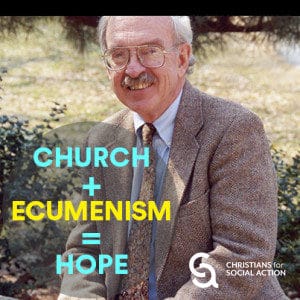When I look at the church, what gives me hope?
There is much to celebrate in today’s global Christianity. In my lifetime, I have seen the evangelical world move from a one-sided emphasis on evangelism to a strong embrace of holistic ministry that combines evangelism and social action. It is wonderful to see the church in the Global South explode in numbers as evangelism continues as a pervasive passion. At the same time, one sees a deepening commitment to social action—a defense of human rights, an attack on sex trafficking, and vigorous work for economic justice for all, especially the poor. From American evangelicals to Pentecostals in the Global South, holistic mission is the norm for more and more people. I am hopeful that this trend will continue. And if it does, the church will grow and society will improve.

The fact that so many younger North American evangelicals simply take for granted what an earlier generation either ignored or had to argue for is another reason for hope. Whereas racism plagued many evangelicals in earlier generations, a multicultural, multiracial stance is simply assumed and embraced by this generation of younger evangelicals. In a similar way, today’s young evangelicals understand “in their bones” without any need for argument that justice, creation care, and evangelism are all essential.
Next, I think there is a growing interest in the global church in exploring more vigorously the possibilities of nonviolent action in correcting injustice and resisting violence. This trend is less pervasive than the embrace of holistic ministry, but the impact of Mahatma Gandhi, Dr. King, People Power’s overthrow of Marcos in the Philippines, Solidarity’s nonviolent victory over Polish communist dictators—the list goes on and on—is nurturing the sense that we could do far more than in the past by using nonviolent methods.
Finally, there is a substantial, growing ecumenical movement developing in the church around the world. Much of the church has abandoned the hatred that Protestants and Catholics used to have for each other and that for centuries tore apart the body of Christ. More and more, Christians—including evangelicals—are putting more emphasis on what unites Catholics, Orthodox, and Protestant Christians than on what still divides us. All these groups are active participants in both Christian Churches Together in the USA and The Global Christian Forum.
Finally, Pope Francis himself is a reason for hope. His spirit of humility, welcoming tone, and powerful call for economic justice are slowly transforming the Roman Catholic Church—and also improving the image of Christianity in the broader culture. Almost daily, I pray for Pope Francis’ health, protection, strength, wisdom, and guidance by the Holy Spirit. That he is a good friend of prominent evangelical evangelist Luis Palau is just one small token of hopeful change. And Pope Francis’ passion for both evangelism and social justice is another sign of the encouraging convergence that is happening in the church.
The founder and president emeritus of Christians for Social Action, Ron Sider is Distinguished Professor of Theology, Holistic Ministry and Public Policy and the author of more than 30 books, including Rich Christians in an Age of Hunger and The Scandal of the Evangelical Conscience.



2 Responses
Can we add the testimony of love and forgiveness expressed by Coptic leadership in the face of brutal persecution?
Yes! Wonderful idea!